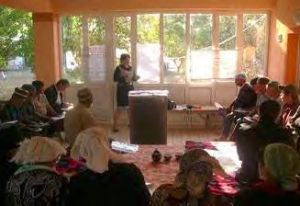
For years, the 28 members of the Abdurakhom Sarkor dehkan farm in the Gafurov district of Sughd province worked long days to grow cotton. Despite their hard work, farm members received meager in-kind payments, usually cotton stalks at the end of the season, and only erratic cash salary payments that never exceeded $250 per year. Most members had to minimize expenses and take menial jobs to provide the basic needs for their families — food, shelter, clothing, and school supplies for their children.
Privately, many members wished they could take control of their economic futures by creating their own farms. Unfortunately, the members lacked adequate knowledge of their land use rights, which allowed the farm director to divvy up revenues as he liked and also prevent the members, particularly those not related to him, from exercising their right to withdraw from the farm to form independent farms. Dadojon Khobilov, one of the USAID Land Reform Project’s tashabbuskors (rural land activists), learned about the farmers’ plight during a focus group he facilitated in the Gafurov district.
Dadojon then arranged for the USAID Land Reform Project legal aid center NGO Saodat to conduct training for the farmers on the steps necessary to establish an individual dehkan farm.
Dadojon Khobilov, one of the USAID Land Reform Project’s tashabbuskors (rural land activists), learned about the farmers’ plight during a focus group he facilitated in the Gafurov district. Dadojon then arranged for the USAID Land Reform Project legal aid center NGO Saodat to conduct training for the farmers on the steps necessary to establish an individual dehkan farm.
Immediately following the training in October 2011, NGO Saodat lawyer Muharram Rasulova assisted eight members of Abdurakhom Sarkor farm, none of whom were related to the farm director, to prepare and execute applications to create individual dehkan farms. Less than two months later all eight members were tilling land on their own individual dehkan farms.
Those eight members now enjoy full freedom of choice over what to grow on their land, how to manage their crops, and when and how to disburse their revenues. One of the new individual dehkan farmers exclaimed, “Now nobody can tell me what to grow on my land, and now I work for exclusively for myself, and will decide what to do with the income I earn!”
During the first two years of activity, the USAID Land Reform Project has helped more than 1,200 farmers, including 718 women, to take control over their economic lives by helping them to establish their own independent and family dehkan farms.

